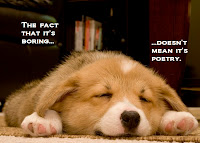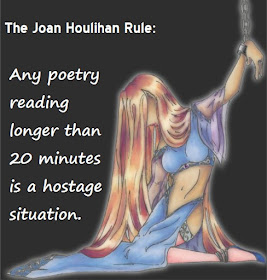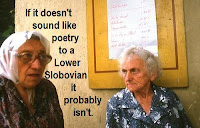Joe (not his real name) is my favorite human being. Indeed, he taught me most of what I know about his species. You'll have to forgive this shaggy dog story about Joe. I'm sure I have a point in here somewhere.
Joe is a quiet guy unless you're talking about the things that interest him. Politics didn't seem to be one of those. I'd always assumed he was apathetic. I could not have been more wrong.
One day, while walking down the street, I saw some citizens waiting to petition the government on a bill concerning women in the workplace. (Apparently, humans don't always treat males and females equally.) The group was made up entirely of women. Except Joe. All had buttons showing which organization they represented. Except Joe, who represented...Joe. Needless to say, I stuck around.
Three hours later the last of the women finished making her case for fairness, none of which seemed to have any impact on the inscrutible conservative all-male panel. (Mental note: conservative and liberal humans seem to have very different definitions of "fairness".) Joe took to the microphone and told his story.
"When I was twelve my Little League baseball team had lost all of its games the year before and had started off with two losses that year. Nevertheless, I had found a pitcher, one with a slider that was unhittable, one who would take us to the World Championship in Williamsport, Pennsylvania. I unveiled my discovery before our third game. As it happened, this was also occasioned by a Pro Day, honoring a visiting Major Leaguer. Perfect! I arranged a demonstration, the Pro (who was a pitcher, but still an adult, professional athlete) batting against the 12-year-old.
"The man struck out in four pitches. He got a little annoyed, saying that this was embarrassing. The kid agreed, before striking him out
in three pitches."
The politicos laughed. Fairness may have been foreign to them but baseball? That they understood.
"I turned to my coach," Joe proceeded. "I was feeling triumphant. 'Meet our new pitcher!' I announced. (Oh, the hubris of youth!)
"Imagine my surprise when our coach said that my wunderkind would never pitch for our or any other team. I was flabbergasted. The best I could do was sputter 'what?' and 'why not?'
"The coach rolled his eyes before intoning: 'Because she's a girl.'
"You see, I thought girls didn't play baseball because they didn't
want to. It never occurred to me that anyone would write a rule
preventing them from doing so. Why? Seriously, why??
"An argument ensued in which I focused on talent and the coach spoke elliptically about gender. Pitching arms versus genitals; which of these did not belong in our conversation?
"This was a turning point in my development. For the first time in my albeit sheltered life, I saw that adults could do and, worse, defend some truly stupid things. What bothered me most was not the injustice. As self-centered as I was, what mattered was that this idiocy was cancelling my ticket to Williamsport, Pennsylvania.
"I lost it. I completely lost it. I stood on the mound and screamed an obscenity-laced diatribe questioning the intelligence, species, pedigree, lineage, hygiene, sobriety and integrity of our coach and everyone silly enough to agree with him, starting with the cretins who wrote the offending regulation. This was not my finest hour, and it lasted almost that long before someone brought my father down from the stands to deal with me.
"When I saw my Dad I thought he'd kill me. Obviously, he didn't. In fact, he didn't even punish me. Not so much as lecture. Instead, he leaned forward and spoke one word into my ear. One word."
At this point, everyone tilted their heads, eager to hear that one word. My fur still quivers as I think of Joe leaning forward to whisper it into that microphone:
 |
| "Someday..." |
There was a delayed reaction from the attendees. Some frowned. Others exhaled. Most looked blankly. Eventually, though, all smiled. After a suitable pause, Joe concluded:
"Dad was right. Three years later the courts ruled that, where leagues for girls could not be organized, they could not be prevented from playing in boys' leagues. That was too late to help our team, though. Our inability to play with both genders was like competing with one hand tied behind our backs. I get no consolation from the fact that other teams couldn't include girls, either. Imagine if they could and we chose not to!
"In any case, I never got to go to Williamsport, Pennsylvania."
With that, Joe walked out. I don't remember if the initiative passed or not. I like to think it did and that Joe had something to do with it. He spoke the three languages his counterparts did: humor, sports and, implicitly, business.
We don't sell poetry or its instruction well. It's like we're deaf. A newcomer might ask for a recommendation. "Who is the best poet?" fetches a list, causing the person's eyes to glaze over before they walk off. Someone asks for
one poem to recite at a wedding or funeral and we suggest twenty volume titles. A simple request for a comedic, dramatic or romantic poem meets with a copy of "
The Complete Works of William Shakespeare". Apparently, we don't understand why there is a place in this world for convenience stores
and bulk distributors.
We all know that poetry is a tough sale. Poetry instruction? Not so much. There are tens of thousands signing up for MFA, English and Creative Writing courses every year, most with a poetry element, some with a poetry focus. In addition, there are
hundreds of thousands who reject this approach. Many believe that learning
how to write will affect
what they'll write
about. I don't follow the logic but, apparently, some think that knowing the difference between trochees and iambs makes you grow a beard and speak in Victorian English about wildflowers and broken statues. We hear the complaint:
"I don't want to learn all of that academic bullshit."
From this, we learn to use teaspoons, not shovels.
Additionally, we learn to speak of
their poetry, not ours.
In the "
Why Your Poetry Fails" series we talked about how tiny, granulated,
spoonfed techniques can help the aspiring poet get over the hump so that
their poetry earns publication and contest wins. The idea is to appeal to those who don't want to get a degree in order to win a slam or appear in a 'zine. For many, it's a delicate balance of vanity, laziness, impatience, and an attention span shorter than
Copernicium 285's half-life. Nevertheless, that is the reality we face. As Joe did.
Speaking of Joe, he recently described an initiative starting up in his area. It's like a cross between the "
Why Your Poetry Fails" approach and the "
The 23 Skidoo Project". It's an open mic with a twist. Instead of the dreaded Guest Speaker Reading, an experienced poet takes 5-10 minutes to render a tip. Not a lesson. That word scares or pisses 'em off. A
tip. After questions are addressed the open mic begins. At the end of that the MC asks for a volunteer to perform their work again, this time with a performance coach going over the piece with them.
"Louder. Softer. Modulate! Enunciate. Faster. More emotion. Now slower. Calmer. You exceeded the time limit; cut something." And so on.
Sounds interesting. I hope it's a success.

































